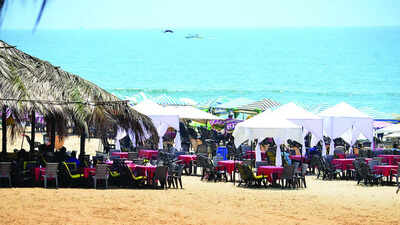Shacks at Goa beaches wind up week earlier due to rain

The beach shacks that are still operating will wind up by the weekend.
PANAJI/CALANGUTE: While some beach shack operators had already wound up operations due to low footfall, the unscheduled rain has compelled most other operators to also shutdown a week prior to the May 31 deadline.
In South Goa, over the last two days, almost all shack structures have been removed. In North Goa, stakeholders said that due to the influx of domestic tourists on summer holidays, just a handful of shacks are still operating at Calangute and Candolim beach entrance and at Baga. And though they are doing roaring business, they will be gone by this weekend.
The beach shack policy states that structures must be removed by May 31 to facilitate beach stretches to recuperate during the four months of monsoon.
This is the second season in a row when the state has seen only domestic tourists, shack owners said.
“In a way it is good because they tend to spend more,” a Candolim shack owner Seby D’Souza said.
Shack Owners Welfare Society (SOWS) president Cruz Cardozo said that a few shacks at Colva beach and three at Cavelossim are on, while the rest have shut and their workers have returned to their respective states.
“The season was OK, but for some it was really bad as their stretches saw a mixed crowd who did not loosen their purse strings,” he said.
Earlier, foreign charter tourists would be the main customers at beach shacks, lounging on beach beds during the day for a suntan. They would hardly visit shacks in the evenings. But with domestic tourists, the scenario has undergone a change.
“It is too hot during the day and so domestic tourists don't come to the beach. But we do good business at night because they like to sit close to the sea," one shack owner said.
Also, with only domestic tourists around, there are fewer takers for continental food, which was earlier a big draw at shacks. Now, it's mostly Indian or Chinese cuisine that is in demand. “It’s only seafood that they go for — golden fried prawns, butter-garlic prawns, crispy prawns, etc,” another owner said.
With the dip in foreign tourists, shacks have been compelled to make changes to the type of food served and the music played.
In South Goa, over the last two days, almost all shack structures have been removed. In North Goa, stakeholders said that due to the influx of domestic tourists on summer holidays, just a handful of shacks are still operating at Calangute and Candolim beach entrance and at Baga. And though they are doing roaring business, they will be gone by this weekend.
The beach shack policy states that structures must be removed by May 31 to facilitate beach stretches to recuperate during the four months of monsoon.
This is the second season in a row when the state has seen only domestic tourists, shack owners said.
“In a way it is good because they tend to spend more,” a Candolim shack owner Seby D’Souza said.
Shack Owners Welfare Society (SOWS) president Cruz Cardozo said that a few shacks at Colva beach and three at Cavelossim are on, while the rest have shut and their workers have returned to their respective states.
“The season was OK, but for some it was really bad as their stretches saw a mixed crowd who did not loosen their purse strings,” he said.
Earlier, foreign charter tourists would be the main customers at beach shacks, lounging on beach beds during the day for a suntan. They would hardly visit shacks in the evenings. But with domestic tourists, the scenario has undergone a change.
“It is too hot during the day and so domestic tourists don't come to the beach. But we do good business at night because they like to sit close to the sea," one shack owner said.
Also, with only domestic tourists around, there are fewer takers for continental food, which was earlier a big draw at shacks. Now, it's mostly Indian or Chinese cuisine that is in demand. “It’s only seafood that they go for — golden fried prawns, butter-garlic prawns, crispy prawns, etc,” another owner said.
With the dip in foreign tourists, shacks have been compelled to make changes to the type of food served and the music played.
FOLLOW US ON SOCIAL MEDIA
FacebookTwitterInstagramKOO APPYOUTUBE
Looking for Something?

Start a Conversation
end of article
Visual Stories
Quick Links
Azam KhanDelhi TemperatureChennai WeatherBangalore TemperatureVismaya Dowry Death CaseCoronavirus in DelhiRTPCR test in GurgaonHyderabad RainPollution level in BangaloreDelhi SmogDelhi TemperatureNoida AQIGurgaon AQI todayFire in MumbaiMumbai RainsCovid 19 RT PCR Test in NoidaDelhi AQI todaySrinagar encounter

